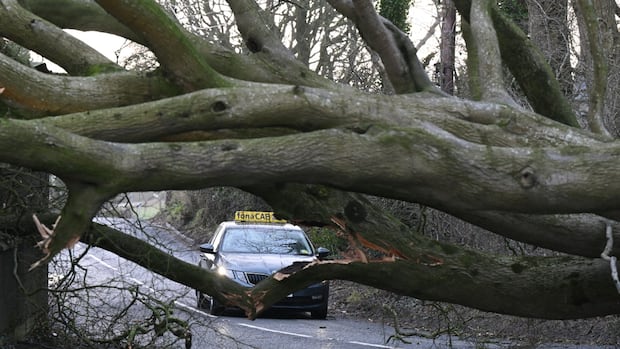Ireland was hit by 113mph wind gusts, the strongest on record, as a winter storm hit the country and northern parts of the UK on Friday, leaving hundreds of thousands of people without power.
Schools were closed, trains stopped and hundreds of flights canceled in the Republic of Ireland, neighboring Northern Ireland and Scotland as the system, dubbed “Storn Éowyn” by weather authorities, struck.
Meteorologists issued a rare “red” weather warning for Friday across the entire island of Ireland and central and south-west Scotland, threatening life.
“Please just stay at home if you can,” Northern Ireland’s First Minister Michelle O’Neill said on BBC Radio Ulster. “We are now in the eye of the storm. We are in the red alert period.”
The Scottish Parliament in Edinburgh closed its doors and Scottish Prime Minister John Swinney said: “We must be clear. People shouldn’t travel.”
More than 700,000 homes and businesses in Ireland and almost 100,000 in Northern Ireland were without power due to “unprecedented, widespread and extensive” damage to electricity infrastructure, the Irish Electricity Supply Board said.

Ireland’s weather bureau Met Eireann said the new wind record was recorded at Mace Head on the west coast and eclipsed the previous mark of 182km/h set in 1945.
The storm is driven by the jet stream and fed by energy in the upper layers of the atmosphere. A rapid drop in air pressure is expected and could turn Eowyn into a bomb cyclone, which happens when a storm’s pressure drops by 24 millibars in 24 hours.

Scientists say it’s difficult to determine the exact impact of climate change on a storm, but all storms occur in an atmosphere that is warming unusually quickly because of pollutants like carbon dioxide and methane released by humans.
“As the climate warms, we can expect these storms to become even more severe and cause greater damage,” said Hayley Fowler, professor of climate change impacts at Newcastle University.


